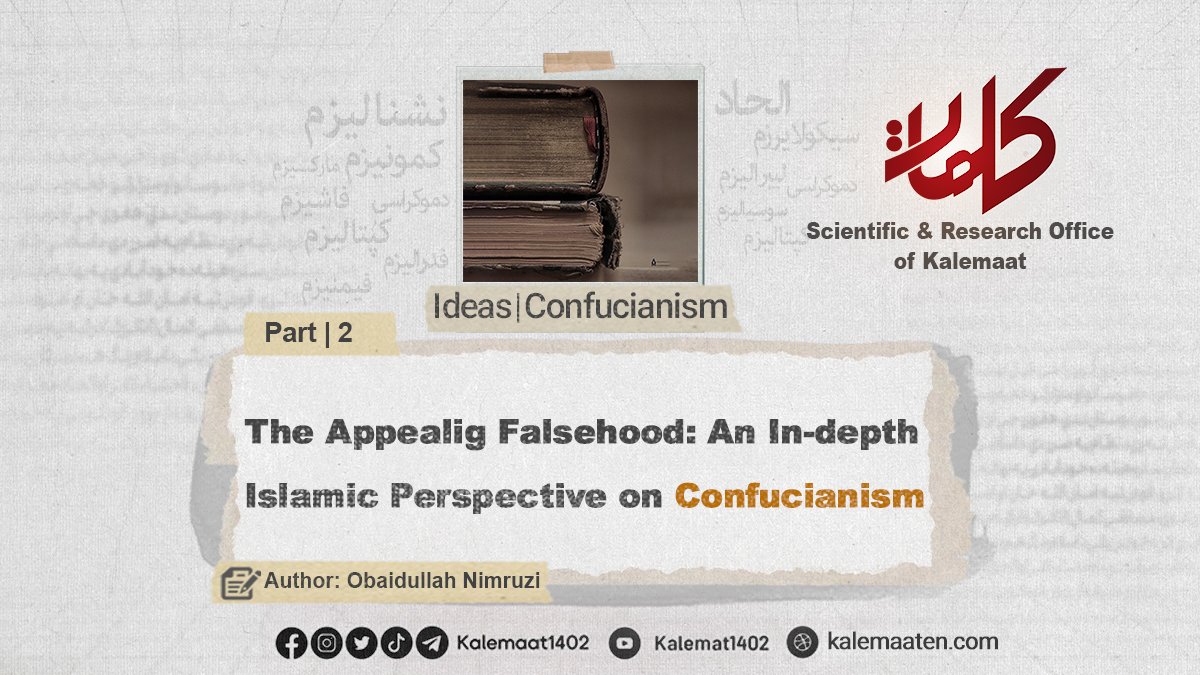
Author: Obaidullah Nimruzi
The Appealing Falsehood: An In-depth Islamic Perspective on Confucianism (Part Two)
Step One: New Horizons and the Necessity of a Comprehensive Understanding of Confucianism
With the growing influence of Eastern schools of thought in today’s world and their impact on contemporary cultures and ideologies, the importance of profound and scholarly understanding of these teachings becomes increasingly evident. This step not only emphasizes the necessity of research but also opens new horizons to explore how understanding Confucianism from an Islamic perspective can help illuminate the path of truth and falsehood.
Step Two: The Historical Background and Emergence of Confucius
Confucius was a Chinese philosopher who, amid the political turmoil and crises of the sixth century BCE, sought to establish an orderly and ethical society. His life and personality, as that of a wise teacher in a time of great upheaval, laid the foundation for a school of thought that is best known through important texts such as the Analects. A precise understanding of this historical context provides a gateway to deeper insights into Confucius’s beliefs and objectives.
Step Three: Fundamental Principles and the Intellectual Structure of Confucianism
This school of thought is built around key pillars such as respect for traditions (Li), humaneness and benevolence (Ren), reverence for ancestors (Xiao), and belief in Tian—a symbol of cosmic order. This section outlines the intellectual and ideological framework of Confucianism and sets the stage for a more thorough critique.
Step Four: Theological and Doctrinal Critique from the Perspective of Pure Monotheism
Using the standards of pure monotheism, the prophethood of messengers, and belief in the afterlife, the teachings of Confucianism are placed under the critical lens of Islam. The belief in Tian instead of Almighty Allah, the denial of divine revelation and prophethood, and the emphasis on ethics without faith—all illustrate the deep rift between this school and the true religion. As the Holy Qur’an states: “وَمَن يَبْتَغِ غَيْرَ الْإِسْلَامِ دِينًا فَلَن يُقْبَلَ مِنْهُ” [Āl-ʿImrān: 85] Translation: “And whoever seeks a religion other than Islam, it will never be accepted of him.”
Step Five: Scholarly Perspectives of Ahl al-Sunnah and Their Theologians
Imam Abu Hanifah (may Allah have mercy on him) clearly states in al-Fiqh al-Akbar that faith without belief in divine oneness, prophethood, and the afterlife is incomplete and invalid. Likewise, Imam Maturidi emphasizes that while reason is beneficial, it cannot be the ultimate guide for humanity without divine revelation. This section presents authoritative scholarly views to strengthen the critique of Confucian beliefs.
Step Six: Summary, Clarification of Truth and Falsehood, and Answering the Central Question
In conclusion, after a comprehensive examination, it is concluded that Confucius was a moral and orderly man; however, his school of thought, from an Islamic standpoint, is deficient and invalid—lacking divine revelation, belief in the One God, and faith in the afterlife. True religion originates only from Almighty Allah, and ethics without faith, though seemingly good, cannot lead to salvation.
Preliminary Conclusion
This study stands at the threshold of a deep, well-documented, and systematic process aimed at thoroughly investigating Confucianism based on the core principles of Islam—especially the foundational tenets of monotheism, prophethood, and belief in the hereafter.
Confucianism, a school that has influenced Chinese civilization for centuries and appears attractive and acceptable to many contemporary societies due to its moral and social facade, holds fundamental ideological deviations from the Islamic worldview. Accurate and scholarly understanding of these differences is essential for every Muslim researcher and scholar.
This research represents a scholarly and fair endeavor that, drawing on the intellectual legacy of Imam Abu Hanifah (may Allah have mercy on him) and the theologians of the Maturidi school, critiques and examines Confucian teachings. The goal is to present a realistic, impartial, and well-reasoned depiction—one that both appreciates the apparent moral aspects of Confucianism and offers a theological and doctrinal critique from an Islamic perspective.
Accordingly, this study avoids hasty judgments and superficial interpretations, instead adopting a systematic, step-by-step approach:
• First, it explores the life, personality, and historical background of Confucius to establish a clear understanding of the context in which this school emerged.
• Then, it introduces and analyzes the doctrinal and ethical foundations of Confucianism, including the belief in Tian (Heaven) in place of the One God, and the roles of humaneness, decorum, and tradition.
• The next step is a theological and philosophical critique of these teachings based on Islam’s three core principles: pure monotheism, belief in divine revelation and prophethood, and belief in the afterlife.
• At the same time, respected views of Sunni scholars—especially those of Imam Abu Hanifah and Maturidi theologians—are employed to reinforce the analysis, ensuring that the critiques are scholarly and well-substantiated.
• Finally, after completing these phases, a definitive conclusion and clear distinction between truth and falsehood in this matter will be presented.
This academic and methodological approach not only avoids shallow and hasty judgments but also enables a clear distinction between true monotheistic teachings and superficial moral values. Therefore, it is hoped that this research will become a turning point in understanding non-monotheistic schools—particularly Confucianism—in today’s world, serving as a guiding light for researchers, students, and all interested readers.
Given the increasing importance of a deep and critical understanding of non-Islamic ideological and religious movements in today’s world, this research is a crucial step toward strengthening Muslims’ epistemological foundations and expanding a reasoned, scholarly religious discourse.
Ultimately, this research journey presents an opportunity—through scientific collaboration and intellectual engagement—to achieve a new and profound understanding of Eastern schools of thought, allowing audiences to gain a clear and firm comprehension of the concepts of truth, falsehood, guidance, and misguidance based on Islamic principles.
Continues…


